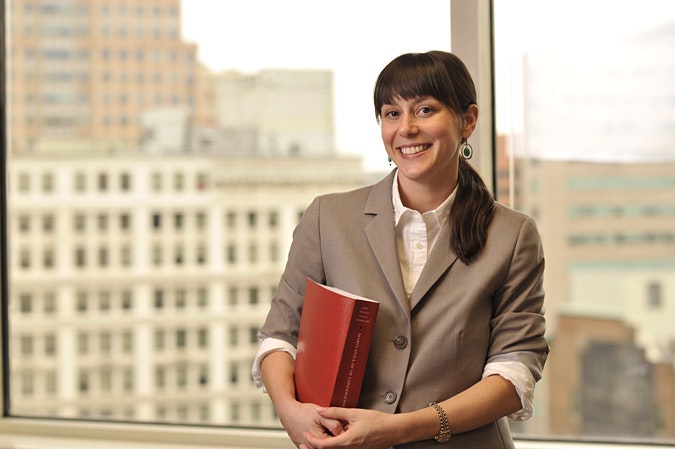The Baltimore Deportation Defense Project
By Debra Rubino

Emily Datnoff was working as an attorney in the immigration clinic at the University of Maryland School of Law when a client from El Salvador—an asylum seeker with a good chance of obtaining immigration relief—was indicted in federal court for selling fraudulent documents.
After the client served her time in jail for the crime, she then found herself back in immigration court, facing deportation.
“She was being doubly punished,” Datnoff says. “If this was any other person who wasn’t an immigrant, after serving their criminal sentence, life would go on. My client served her time just like anybody else, but now she was in danger of having to go back to a country where she was fleeing for her life. This could ultimately have meant death for her. ”
From this experience, Datnoff discovered that criminal law and immigration law treat convictions differently. And public defenders working to keep clients from serving time in jail are usually unaware of this difference.
“A lot of times, what is best for the criminal defendant can have dire consequences for that person when they get back into the immigration system,” Datnoff says.
So Datnoff will use her OSI-Baltimore Community Fellowship to provide immigration advice to public defenders, with the goal of ensuring that clients who are charged with crimes won’t necessarily be rendered inadmissible for immigration relief or deported after they’ve made their way through the criminal justice system.
In addition, Datnoff will represent the clients before the Baltimore Immigration Court after resolution of their criminal matters.
“In the immigration system, you don’t have the right to an attorney, but you can have representation if you can afford it,” Datnoff says. “There are no organizations in Baltimore City that offer low-cost or pro bono services to represent detained non-citizens in the immigration system. So I will take their cases. I will be the person to represent them before the Immigration Court.”
Datnoff’s project, the Baltimore Deportation Defense Project, has been a long time in the making, she says.
“I am so grateful to OSI-Baltimore,” she says. “This project has been in the works for years, and OSI has given me, and my host organization, the Maryland Immigrant Rights Coalition, the opportunity to actually get it going. We couldn’t have done it without them.”
Datnoff, who grew up in North Carolina and Baltimore, spent time studying in Spain, Santiago, Chile and Mexico. After graduating from the University of Maryland Francis King Carey School of Law in 2008, she clerked for the Court of Special Appeals and worked at the law firm Kramon & Graham, P.A. practicing civil litigation.
But after her “eyes were opened” to the intersection between the criminal defense system and the immigration system, she knew she had found her calling.
“This is really important,” Datnoff says. “We’re talking about undocumented immigrants, yes, but also people who might have been here for years legally, for example, who are permanent residents. They could be deported for something as non-serious as shoplifting. We’re not necessarily talking about murder or aggravated assault.”
Datnoff hopes to grow the Baltimore Deportation Defense Project so that many more criminal defense attorneys become versed in immigration law “to be able to competently advise their clients on the consequences they will face in the immigration system,” she says.
Datnoff eventually would like to organize a network of volunteer attorneys from law firms all over the city to provide the pro bono services she’ll be taking on herself during the course of her fellowship.
And ideally, “I would like for this project to outlive the fellowship and become a permanent program within the Maryland Immigrant Rights Coalition, so that there is an organization in Baltimore City where detained non-citizens can receive low-cost or pro bono legal services in immigration court,” she says.
Says Datnoff: “There is a real need for this here.”
Until June 2015, Debra Rubino was the director of strategic communications at OSI-Baltimore.